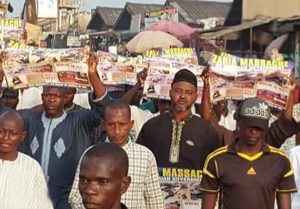In a controversial move that has sparked widespread debate, the Abuja police force dispersed a pro-Palestine protest and arrested six individuals identified as members of the Shi’ite Muslim community. The incident, which occurred in the nation’s capital, has raised questions about freedom of assembly and religious expression in Nigeria.
According to reports from reputable sources such as The Punch and Sahara Reporters, the protest was organized to express solidarity with Palestinians amid the ongoing conflict in the Middle East. Demonstrators gathered peacefully, chanting slogans and carrying placards denouncing Israeli aggression.

However, the situation escalated when law enforcement intervened, citing concerns over public safety and potential unrest. Eyewitnesses reported a heavy police presence, with officers using tear gas and water cannons to disperse the crowd. Six individuals were subsequently apprehended and taken into custody.
The arrested individuals are believed to be members of the Islamic Movement in Nigeria (IMN), a Shi’ite Muslim group that has been at odds with the Nigerian government in recent years. The IMN has faced accusations of inciting violence and engaging in unlawful activities, leading to numerous clashes with security forces.
The police crackdown on the pro-Palestine protest has drawn criticism from human rights organizations and civil society groups, who argue that it infringes upon the fundamental rights of freedom of expression and peaceful assembly. Amnesty International, in a statement released shortly after the incident, condemned the arrests and called for the immediate release of the detainees.
The incident has also sparked a heated debate within the Nigerian public, with opinions divided along religious and political lines. Some have defended the police action, arguing that it was necessary to maintain law and order and prevent the protest from turning violent. Others, however, have accused the government of suppressing dissent and targeting the Shi’ite minority.
The Abuja police have defended their actions, stating that they were acting in the interest of public safety and upholding the law. They maintain that the protest was unauthorized and posed a risk to public order. However, critics argue that the police response was disproportionate and violated international human rights standards.
The arrests of the six Shi’ite Muslims have further fueled tensions between the IMN and the Nigerian government. The group has a history of protesting against what it perceives as government persecution and discrimination. The IMN’s leader, Sheikh Ibrahim Zakzaky, has been in detention since 2015, following a violent clash with the military that resulted in the deaths of hundreds of his followers.
As the situation continues to unfold, it remains to be seen how the incident will impact the already strained relationship between the Nigerian government and the Shi’ite community. The crackdown on the pro-Palestine protest has raised important questions about freedom of expression, religious tolerance, and the use of force by law enforcement in Nigeria. The international community is watching closely, as the incident has the potential to further destabilize an already fragile region.
In the end, the crackdown on the pro-Palestine protest in Abuja has ignited a firestorm of controversy, with far-reaching implications for human rights, religious freedom, and political stability in Nigeria. As the nation grapples with these complex issues, the question remains: will justice and reconciliation prevail, or will the cycle of violence and repression continue?

